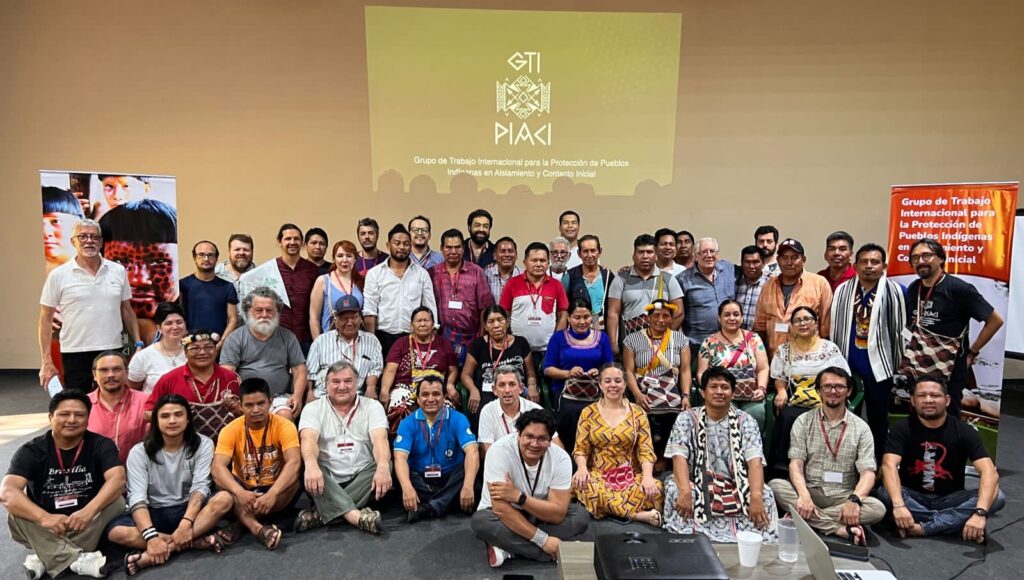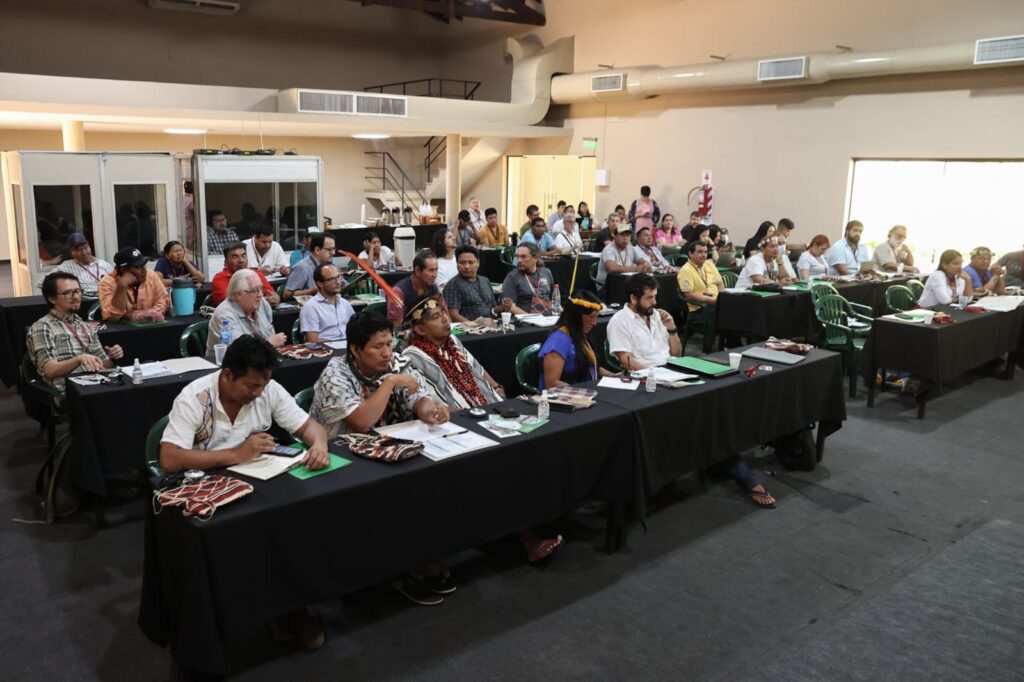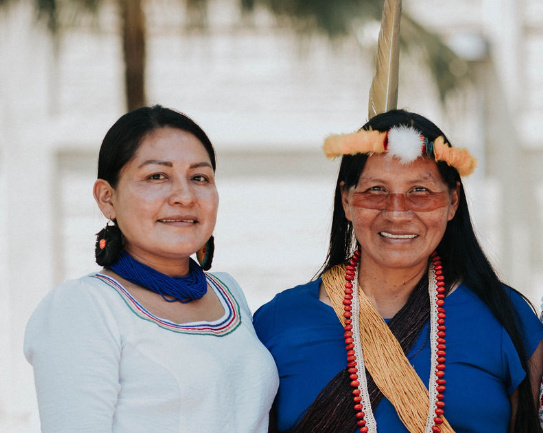
From December 5-9, representatives from Indigenous Peoples’ and civil society organizations from across South America gathered in Asunción, Paraguay, for the annual meeting of the International Working Group on Indigenous Peoples Living in Voluntary Isolation and Initial Contact (GTI-PIACI). They gathered to analyze the current situation of the PIACI in the Amazon and the Gran Chaco, and develop joint strategies to defend their collective rights and address threats to their territories and lives.
GTI-PIACI is an international working group made up of Indigenous Peoples’ representative organizations, non-governmental organizations, and academics, who are committed to the protection, defense, and promotion of the rights of Peoples Living in Voluntary Isolation and Initial Contact (PIACI) in the Amazon and the Gran Chaco. Land is Life, as the Secretariat of the working group, brought together over 60 representatives from 25 organizations across South America.
There are an estimated 185 distinct Indigenous Peoples Living in Voluntary Isolation in South America. Each of these peoples are exposed to extremely high vulnerability due to (illegal) mining, timber concessions, oil extraction, drug trafficking, industrial agriculture, overfishing, infrastructure construction, and climate change. States have continuously failed in protecting Peoples Living in Voluntary Isolation from these threats. Land is Life and GTI-PIACI have taken a leading role in the protection of these peoples, in which their right to self-determination and to the principle of “no contact” is at the core. For them, “no contact” means freedom, and this freedom is lost if contact emerges.

During the 4-day meeting, all members of the GTI PIACI working group shared the steps that they have taken towards the defense of human rights of the PIACI in their regions. Strategies for the protection of the PIACI were shared among the participants, alongside discussions on research methodologies for defining their territories.
Much attention was paid to the alarming situation of the PIACI in Paraguay. The Ayoreo, who inhabit their cross-border territory in Paraguay and Bolivia, practice nomadic hunting and gathering across large distances. The fragmentation of their territory, due to industrial land use and extreme droughts, have posed an enormous threat to their culture and way of life. State borders have no meaning for the PIACI, and often their territories overlap these borders. Thus, international joint strategies for the protection of these peoples are needed. NGOs in Bolivia and Paraguay are already collaborating in collecting and analyzing data to protect the Ayoreo.
“Everyone has the right to choose their way of life, and that choice needs to be respected…, we are asking the states to withdraw extractive pressures that are causing destruction in the territories of our sisters and brothers, so that they can exercise their right to live in voluntary isolation.” – Zenaida Yasacama, Kichwa woman, CONAIE
“A major risk that we are witnessing is that most states are building roads that cross the territories of the PIACI, prioritizing the desires of oil and mining companies over protecting the Earth. The PIACI have their homes in those areas. These peoples have the right to live a dignified life. They need to be able to gather fruits, and to fish and hunt.” – Alicia Cahuyia, Waorani woman, CONAIE

As a result of the Annual Meeting, the GTI-PIACI Working Group developed a joint declaration for the protection of PIACI. The following declaration captures the regional reflections and conclusions from organizations that took part in the gathering. (Read the Spanish version here.)
1. Comprehensively observing and respecting Indigenous Peoples’ right to self-determination, we ratify the principle of “no contact” as the principal guideline and a fundamental right of Peoples Living in Voluntary Isolation, embodied in the international standards of Indigenous Peoples’ rights. We reject all actions and initiatives that promote forced contact with these peoples.
2. We reaffirm the urgency for the recognition, demarcation and protection of the territories of the PIACI as a fundamental pillar for the exercise of the rights of these peoples.
3. We are alarmed by the regressions and lack of implementation of policies for the protection of the rights of the PIACI in the region, especially regarding the right to life, right to physical integrity, to territory, and to culture.
4. We denounce the situation of the Ayoreo People in the Gran Chaco of Paraguay and Bolivia, where the governments demonstrate lack of political will to implement their responsibilities to protect and demarcate the Ayoreo territory. We demand the governments of Paraguay and Bolivia to implement the Resolution 4-2016 and the Precautionary Measures N° 54.13, granted by the Inter-American Commission of Human Rights (IACHR) in favor of the Ayoreo Totobiegosode.
5. We are alerted by a Peruvian campaign promoting the proposed legislation N°3518-2022-CR, which intends to halt the process for the recognition of Indigenous territories in favor of the PIACI. Therefore, we demand the Congress of the Republic of Peru to permanently withdraw this initiative. Moreover, we stand in solidarity with FENAMAD and condemn the persecution by the logging company Tahuamanu SAC, which operates in the territory of the Mashco Piro People who live in voluntary isolation, with the full acceptance of the State of Peru.
6. Regarding Brazil, we are deeply concerned about the setbacks to the protection of the territories of the PIACI that have occurred over the past few years. Deforestation rates and the invasions of illegal miners have greatly increased in the territories of the Ituna-Itatá, Cachoeira Seca, Vale do Javari, Munduruku, Uru Eu Wau Wau, Yanomami, Piripkura, and Araribóia, among many others. We request that Brazil’s new government places the protection of Indigenous territories at the top of their agenda. We expect that the Brazilian government recognizes and enhances Indigenous initiatives towards the protection of their territories.
7. We denounce the lack of policies to safeguard the lives of PIACI in Bolivia, such as the Ayoreo, Ese Ejja, Toromona, Chiman-T´simane, Chácobo and Pacahuara, who inhabit areas threatened by the expansion of industrial agriculture, mining, fossil fuel extraction, and drug trafficking. We condemn the lack of political will to entitle lands for the Tacana II Indigenous People (CITRMD), which denies the protection of these people living in voluntary isolation. We recommend that the Bolivian authorities implement norms favoring Peoples Living in Voluntary Isolation with due diligence, to guarantee their right to life and self-determination.
8. In Colombia, problems associated with illegal economic activities at the border, such as drug trafficking and illegal gold mining in the Río Puré National Park, pose an enormous risk to the Yuri-Passé People who live in voluntary isolation, due to the contamination, degradation, and erosion of ecosystems that the Yuri-Passé depend on. The ongoing invasion in their territory will potentially result in severe violations of their rights as well as increase the probability for contact. With this in mind, we support the demands for the government to take effective measures to implement the decree for the protection of Peoples Living in Voluntary Isolation (Decreto N° 1232, 2018).
9. We are deeply concerned about the ignorance of the rights of Indigenous Peoples in Suriname. Particularly we call for the recognition of the existence of Peoples Living in Voluntary Isolation, in accordance with the testimonies of Trio (Tiriyó) and Wayana Elders.
10. In Ecuador, despite taking the first steps in the institutional progress regarding the protection of Peoples Living in Voluntary Isolation, we note that these peoples are exposed to severe threats, such as road construction, the expansion of oil drilling and, above all, the institutional erosion that slows down any advancements regarding the protection of Peoples Living in Voluntary Isolation. The failure to implement the Precautionary Measures 91/06 of 2006, in favor of the Tagaeri-Taromenane resulted in the IACHR referring the case N° 12.979 to the Inter-American Court of Human Rights in September 2020.
11. In some regions, especially in Brazil, Bolivia and Paraguay, the occurrence of forest fires continues, which is deeply tied to the severe impacts of climate change as well as the loss of water resources and livelihoods of Indigenous Peoples and the PIACI.
12. There are many Indigenous Peoples and PIACI who inhabit the borderlands of our countries. We consider that attention needs to be paid to these cross-border realities, to bolster action towards the recognition of these territories by the states in question. Of particular concern is the situation of the Yanomami People and the invasion of their territory.
13. We are deeply concerned about the situation and the rights to life as well as bodily and cultural integrity of Indigenous leaders and defenders of PIACI rights in the region. Of special concern are the murders of Indigenous Defenders by militias of industrial cattle and soy farmers, loggers, drug traffickers, and land grabbers, among others, that constantly take place in this region.
We join the demands for justice for these victims, such as Paulino Guajajara, Bruno Araújo Pereira and Dom Phillips. We also condemn the criminalization of Indigenous leaders and those who defend the rights of Indigenous Peoples Living in Voluntary Isolation.
14. It is crucial to emphasize that Indigenous Peoples in Initial Contact are exposed to extremely high vulnerability due to the continuous violations of their rights to free, prior, and informed consent, to territory, and to self-determination.
15. The above-described situations demonstrate the lack of political will of governments to implement the Guidelines on the Protection of Indigenous Peoples in Voluntary Isolation and in Initial Contact by the UN High Commissioner for Human Rights (OHCHR), and the resolutions of the Inter-American Human Rights System. Meanwhile, political will persists to bolster the extractivist development model and the construction of megaprojects in Indigenous territories in the region.
16. We are deeply committed to strengthening the GTI-PIACI Working Group, with the objective to enhance the protection of, and the prevention of threats towards the PIACI at the international, regional, national and local levels. We acknowledge the importance of effective participation of Indigenous Peoples and their organizations in the protection of the PIACI and their territories.
In the context of severe setbacks and the expansion of illegal, private and state-led activities, we reaffirm our collective commitment to the defense of the rights and the protection of the territories and lives of Peoples Living in Voluntary Isolation and Initial Contact, in order to prevent an imminent genocide.
We call on international bodies and organizations as well as the civil society at national and international levels, to join forces on this collective objective. We urge states to take all effective measures to protect the PIACI and guarantee their rights.
Signatories
Asociación Interétnica de Desarrollo de la Selva Peruana – AIDESEP
Associação do Povo Indígena Arara – APIA
Amazon Conservation Team – ACT
Associação do Povo Indigena Uru Eu Wau Wau – Jupaú,
Central Indígena de Comunidades Tacana II del Río Madre de Dios – CITRMD
Central Indígena de la Región Amazónica de Bolivia – CIRABO
Confederación de Organizaciones Indígenas del Ecuador – CONAIE
Coordenação das Organizações Indígenas da Amazônia Brasileira – COIAB
Consejo Machiguenga del Río Urubamba – COMARU
Centro de Trabalho Indigenista – CTI
Centro de Estudios Jurídicos e Investigación Social – CEJIS
EAMI Paraguay
Equipe de Apoio aos Povos Indígenas Livres, Eapil – CIMI
Federación Nativa del Río Madre de Dios y Afluentes – FENAMAD
Fondo Ecuatoriano Populorum Progressio – FEPP
Guardiões da Floresta
Iniciativa Amotocodie – IA
Instituto Maira
Land is Life
Nacionalidad Waorani del Ecuador – NAWE
Organisatie van Inheemsen in Suriname – OIS
Observatorio dos Direitos Humanos dos Povos Indígenas Isolados e de Recente Contato – OPI
Organização Indígena dos Manchineri da Terra Indígena Mamoadate – MAPPHA
Organización de los Pueblos Indígenas de la Amazonía Colombiana – OPIAC
Organización Payipie Ichadie Totobiogosode – OPIT
Organización Regional AIDESEP Ucayali -ORAU
Organización Regional de los Pueblos Indígenas del Oriente – ORPIO
Unión de Nativos Ayoreo del Paraguay – UNAP
Grupo Socioambiental – WATANIBA
União dos Povos Indígenas do Vale do Javari – UNIVAJA